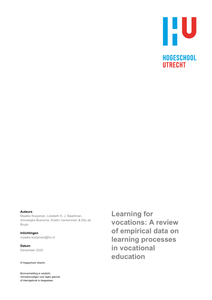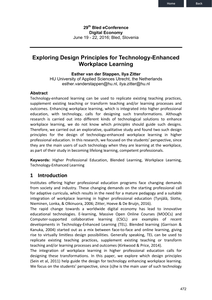Het plan van aanpak gepresenteerd in deze handreiking is bedoeld als leidraad voor het ontwerpen, ontwikkelen, implementeren en evalueren van verschillende Learning Communities binnen het RAAK-5 project Het Nieuwe Telen: gas erop! Het is bedoeld om zowel inzichten als instrumenten te bieden aan coördinatoren en facilitatoren voor de implementatie van de lokale Learning Communities gedurende het project. Deze handreiking is een noodzakelijke aanvulling op het project vanwege de prominente rol van Learning Communities binnen het project, maar ook omdat er geen wetenschappelijk gebaseerde ontwerpprincipes voor LC’s te vinden zijn. Er zijn veel projecten die Learning Communities uitvoeren, maar een grondige zoektocht naar literatuur en internetbronnen resulteerde niet in ontwerpprincipes.
DOCUMENT

Background: Revealing tacit knowledge often is seen as very valuable for organizations, although it is usually challenging to enunciate and share this type of knowledge. Methods: This study uses a participatory design and the application of a board gaming simulation as instruments to extract tacit knowledge. To illustrate this application, the gaming simulation is played with entrepreneurs from horticulture. Horticulture represents a complex social system where tacit knowledge plays a major role in the trade process. A participatory design process is used to explore whether the design and play of gaming simulations enable participants to explicate their tacit knowledge. Participants’ participation in designing the gaming simulation explicated that reconstructing reality was a prerequisite for their commitment. Results: The results from playing simulation sessions show that participants were able to: (1) narrow down the anecdotic behaviour to a few factors; (2) to structure these factors; (3) explore how these factors relate to trade barriers and (4) to explain which tactics are applied to foster trade. Conclusion: The educational value of this study is that it helped entrepreneurs in understanding complex real-life situations.
MULTIFILE

To adequately deal with the challenges faced within residential care for older people, such as the increasing complexity of care and a call for more person-centred practices, it is important that health care providers learn from their work. This study investigates both the nature of learning, among staff and students working within care for older people, and how workplace learning can be promoted and researched. During a longitudinal study within a nursing home, participatory and democratic research methods were used to collaborate with stakeholders to improve the quality of care and to promote learning in the workplace. The rich descriptions of these processes show that workplace learning is a complex phenomenon. It arises continuously in reciprocal relationship with all those present through which both individuals and environment change and co-evolve enabling enlargement of the space for possible action. This complexity perspective on learning refines and expands conventional beliefs about workplace learning and has implications for advancing and researching learning. It explains that research on workplace learning is itself a form of learning that is aimed at promoting and accelerating learning. Such research requires dialogic and creative methods. This study illustrates that workplace learning has the potential to develop new shared values and ways of working, but that such processes and outcomes are difficult to control. It offers inspiration for educators, supervisors, managers and researchers as to promoting conditions that embrace complexity and provides insight into the role and position of self in such processes.
DOCUMENT

This article reports on a literature review on empirical research investigating learning for vocations in the context of vocational education. We included 36 studies in which learning for vocations is empirically studied. Learning for vocations is characterised based upon prevalent research traditions in the field and framed from the perspective of vocational education and organised learning practices. This framing and characterisation directed the search terms for the review. Results show empirical data on vocational learning and illustrate how learning processes for the functions of vocational education - vocational identity development, development of a vocational repertoire of actions, and vocational knowledge development - actually take place. The review further shows that, empirical illustrations of learning processes that occur in the context of vocational education and organised learning practices are relatively scarce. The findings can be typified in relation to our theoretical framework in terms of three learning processes, that is learning as a process of (a) belonging, becoming, and being, (b) recontextualization, and (c) negotiation of meaning and sense-making. We argue that more empirical research should be carried out, using the functions of vocational education and the three learning processes to better understand vocational learning.
DOCUMENT

In small businesses with no employees, learning environments have a low learning readiness. Consequently, learners need to rely on their own agency to shape their learning experiences. Results from a study of agricultural entrepreneurs indicated that the components of motivation and self-regulated learning strategies shape learner's agency and explain learning environment configuration in small businesses with no employees. Configuration of the learning environment was found to be a weak determinant of the learning performance of these learners. However, results showed that prior performance of learners in small businesses with no employees dictates how their agency operates and what learning effect is achieved; higher prior performance results in higher learning effects. We conclude that mechanisms that underlie learning in traditional learning environments work similarly in learning environments in small businesses with no employees.
DOCUMENT
This chapter explores qualitative career assessment as an identity learning process where meaning-oriented learning is essential and distinguished from conditioned or semantic types of learning. In order to construct a career identity in the form of a future-oriented narrative, it is essential that learners are helped through cognitive learning stages with the help of a dialogue about concrete experiences which aims to pay attention to emotions and broadens and deepens what is expressed.
DOCUMENT
The workforce in the EU is ageing, and this requires investment in older workers so that the organisations in which they work remain competitive and viable. One such investment takes the form of organising and facilitating intergenerational learning: learning between and among generations that can lead to lifelong learning, innovation and organisational development. However, successfully implementing intergenerational learning is complex and depends on various factors at different levels within the organisation. This multidisciplinary literature review encompasses work from the fields of cognitive psychology, occupational health, educational science, human resource development and organisational science and results in a framework that organisations can use to understand how they can create the conditions needed to ensure that the potential of their ageing workforce is tapped effectively and efficiently. Although not a comprehensive review, this chapter serves as a basis for further empirical research and gives practitioners an insight into solving a growing problem.
DOCUMENT

From the article: "Abstract, technology-enhanced learning can be used to replicate existing teaching practices, supplement existing teaching or transform teaching and/or learning process and outcomes. Enhancing workplace learning, which is integrated into higher professional education, with technology, calls for designing such transformations. Although research is carried out into different kinds of technological solutions to enhance workplace learning, we do not know which principles should guide such designs. Therefore, we carried out an explorative, qualitative study and found two such design principles for the design of technology-enhanced workplace learning in higher professional education. In this research, we focused on the students' perspective, since they are the main users of such technology when they are learning at the workplace, as part of their study in becoming lifelong learning, competent professionals."
DOCUMENT

The model of the Best Practice Unit (BPU) is a specific form of practice based research. It is a variation of the Community of Practice (CoP) as developed by Wenger, McDermott and Snyder (2002) with the specific aim to innovate a professional practice by combining learning, development and research. We have applied the model over the past 10 years in the domain of care and social welfare in the Netherlands. Characteristics of the model are: the interaction between individual and collective learning processes, the development of (new or better) working methods, and the implementation of these methods in daily practice. Multiple knowledge sources are being used: experiential knowledge, professional knowledge and scientific knowledge. Research is serving diverse purposes: articulating tacit knowledge, documenting the learning and innovation process, systematically describing the revealed or developed ways of working, and evaluating the efficacy of new methods. An analysis of 10 different research projects shows that the BPU is an effective model.
DOCUMENT

The Best Practice Unit (BPU) model constitutes a unique form of practice-based research. A variant of the Community of Practice model developed by Wenger, McDermott and Snyder (2002), the BPU has the specific aim of improving professional practice by combining innovation and research. The model is used as a way of working by a group of professionals, researchers and other relevant individuals, who over a period of one to two years, work together towards a desired improvement. The model is characterized by interaction between individual and collective learning processes, the development of new or improved working methods, and the implementation of these methods in daily practice. Multiple knowledge resources are used, including experiential knowledge, professional knowledge and scientific knowledge. The research serves diverse purposes: articulating tacit knowledge, documenting learning and innovation processes, systematically describing the working methods that have been revealed or developed, and evaluating the efficacy of the new methods. Each BPU is supported by a facilitator, whose main task is to optimize learning processes. An analysis of ten different BPUs in different professional fields shows that this is a successful model. The article describes the methodology and results of this study.
DOCUMENT
